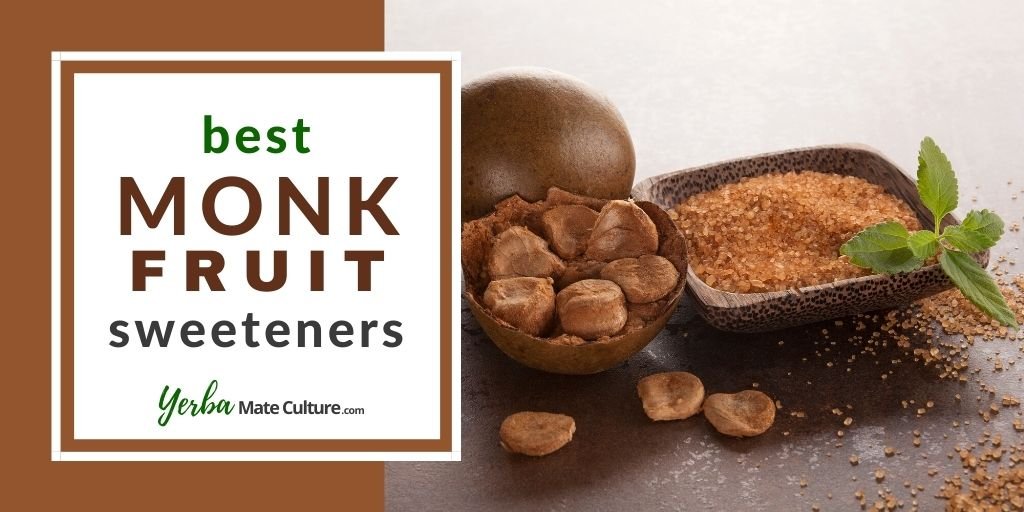The sweet news about pure monk fruit extract is that it’s about 200 times sweeter than sugar!
This sweetening agent that tastes like it was sent from heaven contains no calories, no carbohydrates, and no fat. Switching from sugar to monk fruit sweeteners definitely has some proven health benefits.
In fact, many people looking for sugar alternatives are making the move from artificial sweeteners to monk fruit because of its ability to naturally flavor drinks, foods, and desserts without impacting blood sugar.
Our recommendations for Best Monk Fruit Sweetener:
- Pure Monk Fruit Sweetener: Purisure Monk Fruit Extract
- Organic Monk Fruit Sweetener: NOW Foods Liquid Sweetener
- Most Popular: Lakanto Classic Monkfruit Sweetener
- Liquid Monk Fruit Sweetener: EZ-Sweetz Stevia & Monk Fruit
- Flavored Monk Fruit Sweetener: Lakanto Sugar Free Maple Syrup
Monk Fruit Sweeteners Explained
Native to Southeast Asia, monk fruit is a rounded, gourd-like fruit that grows on vines. The fruit’s name comes from the fact that it was once cultivated by Buddhist monks.
While monk fruit has been popular in places like Thailand and China for centuries, it’s only just beginning to catch on in places like the United States. It has been used in traditional herbal medicine to help relieve sore throat, reduce phlegm and promote overall wellness.

More recently, modern science has revealed that monk fruit can offer a bevy of health benefits that range from managing blood sugar to preventing cancer.
How Are Monk Fruit Sweeteners Made?
Getting the full health benefits and flavor of monk fruit isn’t exactly as simple as taking a bite after plucking one off the vine.
Monk fruit sugar is made by removing the seeds and skin from the fruit once it’s ripe. Next, the “meat” is crushed to allow for the juices of the fruit to be collected before being turned into liquid or powder extract.
However, it’s not the “juice” of the monk fruit that holds all the sweetening power.
Monk fruit sweeteners are actually produced by extracting mogrosides, that are 200 times sweeter than sugar, from the juice.
Mogrosides are molecules that are found in many plants. In addition to producing powerful sweetness, mogrosides are also packed full of antioxidants that offer some great potential for savoring your way to better health!
Advantages of Monk Fruit Sweeteners
No Calories: Perfect for adding sweetness to things like homemade lemonade and ice tea, monk fruit sweetener allows you to make “diet” versions of just about anything that usually contains sugar.
Good for People With Diabetes: Monk fruit doesn’t affect blood sugar levels. It has a glycemic index (GI) of zero.
Good for the Keto Diet: The lack of sugar, calories, and carbs in monk fruit makes it a keto-approved ingredient. In fact, it’s commonly used in desserts by keto chefs.
Anti-Inflammatory and Anti-Cancer Properties: Researchers have found that the mogrosides in monk fruit extract may inhibit inflammation by down-regulating the expression of key inflammatory genes while up-regulating some inflammation protective genes. There’s also evidence of mogrosides’ potential anti-cancer properties.
Anxtiodxant Benefits: According to a 2013 study, the mogrosides found in monk fruit sweetener exhibit an antioxidant effect by reducing intracellular reactive oxygen species (ROS) and regulating the expression of genes involved in glucose metabolism. This could be important for regulating Type 2 diabetes.
No Cavities: Monk fruit sweetener isn’t fermentable the way that some sweeteners like sugars and erythritol are. That’s great news if you’re concerned about cavities and dental health.
Types of Monk Fruit Sweeteners
Let’s take a quick look at different kinds of monk fruit sweeteners to help you with choosing the type of product that is best for you.
Pure Monk Fruit Extract
This is a pure extract from the fruit. It has not been adulterated with any other ingredients. Expect a coarse, sugar-like consistency with pale-beige coloring if you purchase powdered monk fruit extract.
The benefit of going with pure extract is that you’re never dealing with any additives or net carbs.
Monk Fruit With Erythritol and Other Sugar Alcohols
Many brands use sugar alcohols like erythritol to “cut” the sweetness of monk fruit while creating more of a sugar-like flavor. While erythritol is only about 70 percent as sweet as sugar, it helps to stimulate the sweetness receptors on the tongue to create a taste that’s more like sugar.
Monk fruit with erythritol can be beneficial when using sugar substitutes in your favorite beverage or dessert recipes because it gets you closer to the taste of real sugar. Generally, people who are baking desserts for keto and low-GI diets rely on monk fruit with erythritol as an easy sugar substitute because it allows you to do one-to-one sugar substitutions without having to alter recipes.
It’s also possible to simply blend monk fruit and erythritol when creating a sweetener specifically for baking even if you prefer “pure” monk fruit for sweetening day-to-day drinks like coffee and tea.
However, erythritol has no health benefits and some people get digestive problems and diarrhea from using it.
Monk Fruit With Stevia
Many products blend monk fruit and stevia for an enhanced flavor profile with a smoother sweetness. When the two are mixed, they have the ability to cancel out any astringent and bitter notes to deliver a more sugar-like sweetness than either product can produce alone.
Stevia allows you to make monk fruit taste more like sugar without increasing the glycemic index.
Flavored Monk Fruit Sweeteners
Several brands offer flavored monk fruit extracts meant for flavored water, smoothies, teas, and coffee. These products tend to retain the same calorie-free, keto-friendly characteristics of pure monk fruit extract.
Flavors often include classics like vanilla, fruit, and caramel. Some brands even produce monk fruit sweetener that’s designed to recreate the flavor of maple syrup for pancakes and waffles. Of course, the sweeteners don’t actually contain any real maple syrup because this would increase the glycemic index.
5 Best Monk Fruit Sweeteners Reviewed
Best Pure Monk Fruit Sweetener: Purisure Monk Fruit Extract
This ultra-concentrated, ultra-pure monk fruit sweetener is a top pick if you’re looking for a basic sugar substitute to use in anything from muffin recipes to tea and coffee.
- Amount: 4.41 oz (125 g)
- Type: Pure Monk Fruit Extract
- Ingredients: Monk Fruit Extract
Product Highlights:
- Pure and natural without any fillers
- Comes in a convenient resealable pouch
- Great for custom keto baking
- A little goes a long way
- Money-back quality guarantee from the brand if not satisfied
One advantage of buying this classic, pure form of monk fruit extract is that you can cut it with other sweeteners like stevia or erythritol on your own to control sweetness levels and flavor when making different recipes.
Purisure makes it very easy to do conversions by providing a scoop with this product. The instructions provided let you know that one scoop of Purisure monk fruit extract equals one teaspoon of sugar.
Overall, this is the best pure monk fruit sweetener on the market with guaranteed purity and smoothness.
Best Organic Monk Fruit Sweetener: NOW Foods Organic Monk Fruit Liquid Sweetener
NOW Foods monk fruit sweetener is a top choice if you’re looking to flavor all kinds of drinks. You’ll never have to worry about spilling granules in the kitchen, or dissolving them in your drink the way you might with a powdered monk fruit extract.
This is definitely one of the best sugar alternatives for tea and coffee, whether you like them hot or iced!
- Amount: 2 oz
- Type: Organic Liquid Sweetener with Monk Fruit Extract
- Ingredients: De-Ionized Water, Organic Monk Fruit Extract, Organic Cane Alcohol
Product Highlights:
- Great for sweetening drinks with a quick pour
- Produced by a family company operating since 1968
- USDA organic product
- Sustainably produced
The NOW Foods monk fruit sweetener comes in a tincture-style jar that is easy to store. The jar also makes it so easy to pour a few controlled drops into your drink.
This liquid extract contains deionized water, organic monk fruit extract, and 1 percent organic cane alcohol. All ingredients are certified USDA organic.
Most Popular: Lakanto Classic Monkfruit Sweetener
The go-to monk fruit sweetener for people looking for an easy sugar substitute for baking, the Lakanto Classic Monkfruit Sweetener offers the bulk you need to get through recipe after recipe.
This is a great choice for anyone looking to stock up on baking ingredients ahead of the holidays.
- Amount: 3 lbs
- Type: Powdered Sweetener with Monk Fruit Extract
- Ingredients: Erythritol, Monk Fruit Extract
Product Highlights:
- Most popular sugar substitute on Amazon
- Contains non-GMO erythritol to create a more sugar-like flavor for baking
- Great for “bulk” baking
- Formulated for a one-to-one conversion for sugar in recipes
This monk fruit extract is intended to be a one-to-one sugar replacement. That means that you don’t have to do any conversions in your head when using recipes that call for sugar.
The reason why the Lakanto monk fruit sweetener can be used interchangeably with sugar is that it’s cut with non-GMO erythritol. This causes your taste receptors to perceive something closer to the flavor of authentic sugar.
It’s also smart to buy your sweetener in a 3-pound pack like this if you already know you like it because monk fruit sweeteners can be hard to find in ordinary grocery stores in many parts of the country.
Many people who have tried this baker-friendly monk fruit extract feel like they have finally hit gold after trying to make different combinations of sugar work for them without success. The fact that the perfect configuration of sweetness for baking things that taste authentically “sweet” has already been done for you is a real plus when you’re new to keto baking!
This is also a great version of monk fruit for making desserts without the need to use stevia.
Great Liquid Monk Fruit Sweetener: EZ-Sweetz Stevia & Monk Fruit
This is a great product for someone who wants to sweeten beverages or is trying to drink more water. Each bottle allows you to flavor your drink “on the go.”
- Amount: 1.36 oz
- Type: Liquid Sweetener with Monk Fruit Extract
- Ingredients: Water, Stevia Extract, Monk Fruit Extract, Potassium Sorbate, Sodium Bensoate, Succinic Acid, Citric Acid
Product Highlights:
- 300 servings per bottle
- Fits in bags, purses, and pockets easily
- Formulated to taste like raw sugar
- Easy to pour out a “perfect drop”
- No calories
The important note to make about this monk fruit sweetener is that it isn’t pure monk fruit sweetener. The full ingredient list includes filtered water, stevia extract, monk fruit, potassium sorbate, sodium benzoate, succinic acid, and citric acid.
While none of these ingredients are necessarily incompatible with keto or low-GI living, it’s still important to know about them if you’re avoiding certain additives.
The great thing about choosing EZ-Sweetz Stevia & Monk Fruit is that you never have any individual packs to open. You also don’t have to deal with any granules spilling while sweetening your drinks on the go. The liquid dissolves into your drinks instantly.
While this sweetener is marketed as a flavor enhancer for drinks, it actually can be used for whipping up foods. Many people use it to flavor hot oatmeal. It can also be stirred into any moist food.
Best Flavored Monk Fruit Sweetener: Lakanto Sugar Free Maple Syrup Monkfruit Sweetener
While many people use this liquid monk sweetener as a substitute for maple syrup, it’s also great for sweetening coffee, making marinades, and whipping up cake frosting.
The maple flavor is very convincing. However, this sweetener maintains its keto-friendly, low-GI status by not actually containing any real maple syrup.
- Amount: 26 oz
- Type: Flavored Liquid Sweetener with Monk Fruit Extract
- Ingredients: Purified Water, Tapioca Fiber, Chicory Root Inulin, Potato Starch, Natural Flavors, Sea Salt, Monk Fruit Extract, Fruit Juice, Natural Citrus Extract
Product Highlights:
- The flavor that resembles maple syrup
- Contains only 1 net carb
- Bottle stores easily in the fridge
- No artificial ingredients
- Non-GMO ingredients
While this is an extremely high-quality monk fruit sweetener, it’s not pure monk fruit. The list of ingredients includes tapioca fiber, chicory root inulin, potato starch, natural flavors, sea salt, and a few other things in addition to monk fruit extract.
While none of these ingredients will interfere with most keto and low-GI diets, they do add 1 net carb.
This product is popular because of its thickness level allowing you to easily glide flavor right over your pancake stacks and desserts. It’s also easy to pour just a smidge into coffee.
Some people have found that the maple flavoring adds a slight bitterness that isn’t as prevalent in unflavored monk fruit extract.
Monk Fruit Sweetener FAQ
How much monk fruit sweetener do I need to replace sugar?
How much monk fruit sweetener you need for replacing, let’s say, one tablespoon of sugar, depends very much on the content of the sweetener.
Pure monk fruit extract can be as much as 200 times sweeter than regular sugar so you only need a tiny amount. However, most products are mixed with other components. Some products (e.g. Lakanto Classic Monkfruit Sweetener) are designed so that they are as sweet as regular table sugar. That makes it easy to use them in baking and other recipes without the need for calculating the amount.
What is the best monk fruit sweetener without erythritol?
All monk fruit sweeteners in this guide are without erythritol except for the Lakanto Classic Monkfruit Sweetener. You can choose one of the products in this guide depending on your preference.
What is the best monk fruit sweetener for keto?
All monk fruit sweeteners in this guide are great for keto. The choice is up to you and depends on your taste preference and how you are going to use the sweetener.








![7 Best Organic Raw Honey Brands Reviewed [2023] best raw organic honey brands](https://yerbamateculture.b-cdn.net/wp-content/uploads/2021/07/best-raw-organic-honey-brands-300x150.jpg)

